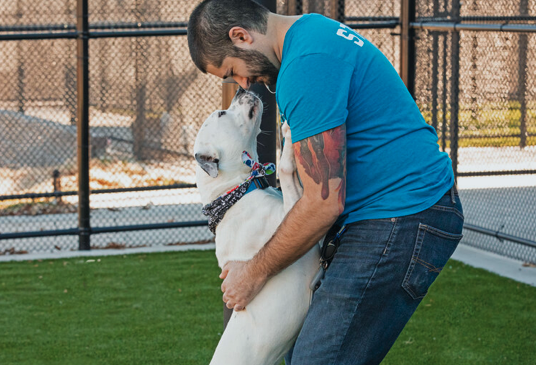Animal Advisory Commission has questions about potential new shelter model
Wednesday, August 12, 2020 by
Nina Hernandez At its meeting Friday, the Animal Advisory Commission considered whether the city should join Human Animal Support Services, an international coalition led by no-kill organization American Pets Alive!
The program would use case management to keep most animals out of the shelter while awaiting adoption. When a person calls with an animal for surrender, the case manager receiving the call would help resolve the issue, whether it’s a lost pet, a pet who needs a temporary foster home, or resources to keep pets in homes.
Proponents like Ellen Jefferson, executive director of Austin Pets Alive!, say the Covid-19 pandemic showed how many people in communities around the country want to help manage our epidemic of homeless dogs and cats.
In her presentation to the commission, Jefferson explained that when the pandemic hit, Austin and shelters across the country were able to put most of their animals into foster homes within the community.
She said the sheltering industry realizes it has to evolve in the face of how much Covid-19 has changed society. We’re staring down mass evictions, she said, that will soon be starting and will continue for months or years. And when pet owners lose their homes and cannot find a new living situation, their pets often wind up in a shelter or worse, on the street.
American Pets Alive! created HASS to prepare for a mass increase in animal needs and to dismantle the underlying foundation of inequity in shelters. That inequality, Jefferson explained, is demonstrated by the digital divide that exists in lower-income communities and makes it harder for them to access city services.
American Pets Alive! is bringing together 18 tier-one communities and another 22 tier-two communities for a 12-month pilot program. The tier-one communities will implement the program first, and the tier-two communities will follow after making modifications based on the first round. The pilot will involve 200 individuals, including industry experts, working in 35 groups to solve long-standing industry problems that prevent progress.
HASS will work on five projects: rehoming without a shelter kennel, lost and found services without a shelter kennel, keeping pets with families (medical and behavioral support), public safety reimagined, and an immediate exit route for shelter animals.
“This is an immense change and an immense opportunity and we need to make sure that we’re doing it right,” Jefferson said.
Right now most services are provided in the shelter. In the future, HASS wants to use a case management system to connect the resident with a city employee who will work to help them triage their problem and access available resources; for example, boarding an animal while its owner goes to rehab.
“HASS is not leaving animals on the street to die,” Jefferson said. “HASS is not forcing people to be part of the network of support. HASS is not preventing animals from being in the shelter who really need to be there. HASS is providing case management to find the right pathway for each individual animal and person. HASS is creating a network of community fosters who are able to accept animals instead of putting them in the shelter kennel.”
Commissioner Andrea Schwartz expressed concern that many people have a lot of free time right now due to the stay-at-home order, but that won’t last forever. “It’s a unique, temporary situation,” she said. “We just really can’t assume that people will continue to have as much free time after Covid-19.”
She cited a Best Friends Animal Society town hall, which showed an initial bump in foster applicants at the beginning of the pandemic in March, and a leveling off by April.
“Who is going to fill the needs of the 14,000 strays that came in last year, when each is supposed to have a HASS counselor?” Schwartz said. “Many of my East Austin neighbors think that HASS is unfeasible and will ultimately put the burden on them, and I share that concern.”
Commissioner Jo Anne Norton said that the idea of a hotline concerns her because of the amount of record-keeping by the city such a program would require. She asked staff what kind of burden it would put on them to have to talk to residents in real time. She clarified that there is no budget for case managers or real-time chatting.
Norton also questioned what would happen in a situation under the new model in which a resident has been told by 311 or Animal Services to keep the stray animal and that animal has contracted rabies or parvo. Staff currently doesn’t know who would be responsible for ensuring public safety.
By the end of the meeting, commissioners still had questions for Jefferson about the program. Norton suggested the commission create a HASS working group to further discuss the various questions. The motion passed unanimously.
The Austin Monitor’s work is made possible by donations from the community. Though our reporting covers donors from time to time, we are careful to keep business and editorial efforts separate while maintaining transparency. A complete list of donors is available here, and our code of ethics is explained here.
You're a community leader
And we’re honored you look to us for serious, in-depth news. You know a strong community needs local and dedicated watchdog reporting. We’re here for you and that won’t change. Now will you take the powerful next step and support our nonprofit news organization?



